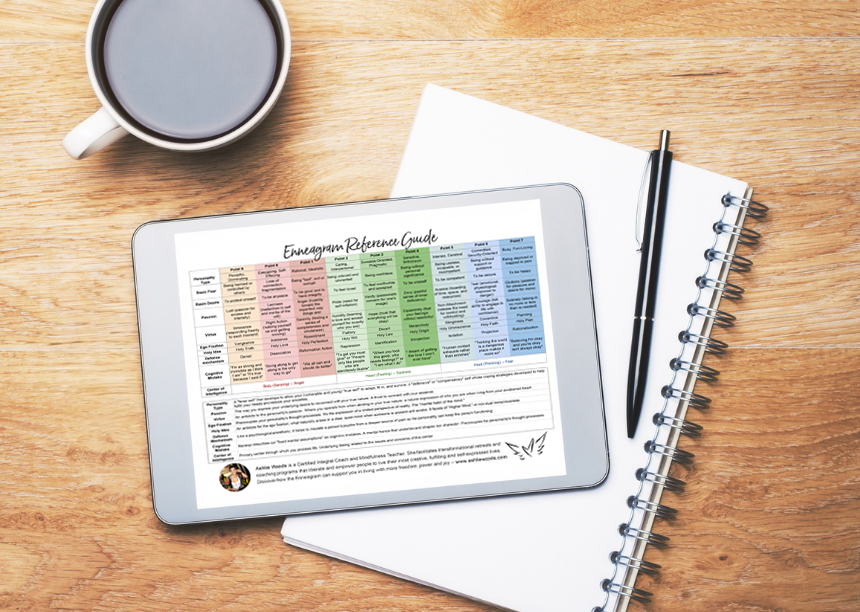Social Four — “Shame”
The Social Four appears emotionally sensitive (or oversensitive), feels thing deeply, and suffers more than most people. For this Four, there is a desire to be witnessed and seen in their suffering. They hope that if their suffering is sufficiently recognized and understood, they might be forgiven for their failures and deficiencies and loved unconditionally.
Naranjo explains that Social Fours are people who lament too much and who often put themselves in the victim role. They can appear self-sabotaging when they broadcast their suffering and their victimhood as a way of engendering sympathy in others, but they also undermine themselves by being too attached to the causes of their suffering.
This quick reference guide captures the various aspects of each Enneagram Type including attributes, basic fears, desires, passions, virtues, fixations, defense mechanisms, and more!
In this Four, envy fuels a focus on shame and suffering by providing a constant source of pain: a feeling that others have what the Four wants. However, they believe that their suffering is also what makes them unique and special- there is a kind of seduction of others through suffering.
Fours' motivation for dwelling too much in suffering and sensitivity seems to be connected to an idea that suffering will be the shortest path to heaven. Like the child that cries to attract the mother's care, they have the idea that the way to happiness is through tears. While there is some truth to the idea that the path of transformation requires difficulty, this higher ideal gets put to use in justifying the expression of dissatisfaction as a way of attracting the help of others. Social Fours rationalize their attachment to suffering instead of doing something about it, and they depend too much on their needs being fulfilled by others. They express the idea that if you convey the intensity of your need in painful enough terms, someone will finally come to your aid and fulfill that need.
Whereas envy motivates Self-Preservation Fours to work to get what they want, it motivates social fours to focus on their emotional dissatisfaction and internal lack. For the social four there is a sense of comfort and familiarity in suffering- the sweet sadness of poetry, the rich meaning and painful beauty in melancholic music- and an unconscious hope that their suffering will somehow redeem them.
The central issue of the social four, however, is not just suffering- it's inferiority. For this subtype, there is a need for self-abasement and self-recrimination, for turning against oneself, for self-weakening. The social four's envy is express through a passion for comparing oneself with others and winding up in the lowest position. To others, the extremity of their mindset and insistence that “there's something wrong with me” can be surprising. They have a poor self-image that they themselves perpetuate. They also engage in self-sabotage a lot: they regularly underestimate themselves and always feel “less than” in comparison to others.
As Naranjo indicates, the social four may evoke a response in others that makes them want to ask, “What's wrong with you that you think there's something wrong with you?” A person with this subtype may be competent, attractive, and intelligent, and yet still tend to focus on and identify strongly with suffering and a sense of deficiency.
Social Fours tend to feel a sense of shame about their wants and needs, and their experience of desire is associated with more guilt than other people's. The social four feels guilty for any wish. Shame puts their internal focus on intense and dark emotions such as envy, jealousy, hatred, and competition. They are too shy to express desires, except through a display of suffering. They don't feel entitled to have their needs met but at the same time may believe that the world is “against” them or that “no one gives me what I want or what I need.”
Social Fours don't compete with others (like sexual fours do) as much as they compare themselves to others and find themselves lacking- almost as if by showing themselves to be lacking they can call forth what they need from others. Underneath, however, they experience a fierce competitiveness that may be largely unconscious: a competitiveness for recognition, being unique and special, and wanting to be in first place. This is more hidden and subtle in the social four, however, than it is in the sexual four.
Social fours explore the pain of the past repeatedly as a way of attracting someone who will take care of them and satisfy their wants. They criminalize their wants, as many of us do, but they suffer more keenly for turning against themselves.
Fours with this subtype tend to think with their emotions- they get entangled in “emotional” thoughts, caught up in and identified with intense emotions to the extent that they can't take action even when it would be good for them to do so. They tend to be generous and to do for others, but they do not take responsibility for their own lives and may dramatize problems to distract themselves from doing something to find a solution.
In public, social fours repress “frowned upon” emotions like anger or hatred and may appear sweet, friendly, and soft- but in private, they may express their emotions they store up in social situations and become aggressive. Generally, they prefer to swallow their own poison rather than externalize it to the people around them, and they typically have difficulty finding their place in a group and in society. These fours may experience themselves as misfits, and yet they also tend to generate social situations of rejection to confirm their shame. They see themselves as victims and may view others as “perpetrators,” and they don't always take responsibility for their own actions or aggressiveness.
Social Fours are less likely to be mistaken for other enneagram types than the other two four subtypes, but they can look like sixes in their focus on what's missing or wrong in their lives. However, unlike sixes, they have a desire to be special (as opposed to type six's identification with the “everyman”, and they spend less time in fear and more time feeling emotions related to sadness, pain and shame.
Elizabeth, a social four, speaks:
“I've been called “hyper-sensitive” my entire life. My feelings have always been so easily hurt- even at the tender ages of three and four I often felt terribly misunderstood fr forsaken. I remember crying in my room at four years old racking my brain trying to figure out what was going on such that my family didn't get me and could be so hurtful. I came to believe that there was something wrong with me and that I didn't matter. These have remained bedrock beliefs for much of my life.
Feeling different, misunderstood, and dejected were my constant companions and felt like home. Over time, I developed an attraction and attachment to my pain and suffering because that's what feels most real and resonant with the pervasive sense that something is really wrong (with me or the world around me.) Experiencing my pain leads to feeling more connected with myself, which then alleviates the pain of feeling disconnected and misunderstood. Thus when a dark feeling hits, my impulse is to hang out with it and get to the bottom of it. And I tend to get irritated and feel even more misunderstood when people suggest lightening up, getting some exercise, or going to see a funny movie. Melancholy has always been my favorite feeling. Not only is it comforting in and of itself, but it creates a portal to my depths, my creativity, and a feeling of being at home in myself.
Despite the tremendous amount of positive feedback I have received in so many areas of my life, I still wrestle with a poor self-image every day. My friends, loved ones, and associates are always shocked to discover the discrepancies between how they view me and how I view myself. As a student, I was always surprised to et my papers and tests back with very high grades and glowing comments. And even now when I share my creative or professional work I am startled to hear the heartfelt positive feedback from others. My barometer for assessing the quality of my work in any area is greatly skewed toward “this could have been a lot better.” And then it's back to “Poor me- I have a broken barometer, can you help me fix it?”.
Specific Work For The Social Four on the Path from Vice to Virtue
Social Fours can travel the path from envy to equanimity by doing the work it takes to release their inferiority complex, own their positive qualities, and enhance their self-confidence. If you are a social four, it will help you to work on relaxing your self-judgments and negative self-perceptions- to take the risk to see what is positive about you and your life and not get stuck in envious comparisons and shame. Manifesting a sense of equanimity means valuing all your feelings equally, and also not getting over-identified with your feelings. It helps to consider that it's okay to be angry and express wishes and feelings directly, from a place of self-compassion, instead of seducing through suffering. Most of all, you can support yourself in embodying equanimity by considering all your feelings, consciously analyzing the whole situation, and taking action to get what you need and want instead of becoming so invested in your emotional suffering.
Sourced with permission from The Complete Enneagram by Beatrice Chestnut.
Type 1 Type 2 Type 3 Type 4 Type 5 Type 6 Type 7 Type 8 Type 9
Ashlie Woods
Director of Business Division & Lead Coach at Sourced
Ashlie is a transformational coach, retreat leader, dance lover and Enneagram enthusiast. She is passionate about facilitating experiences that liberate and empower people to live their fullest, more creative and self-expressed lives. She believes there is a life that wants to be lived through you and a purpose only you can fulfill.
She spent 6 years designing and delivering corporate training programs focused on leadership development and company culture before making the bold leap to start her own retreat-based business.
Ashlie now supports heart-centered business owners (coaches, consultants, creatives, healers) to market, sell and deliver their transformational work in the world using their unique magical gifts.




